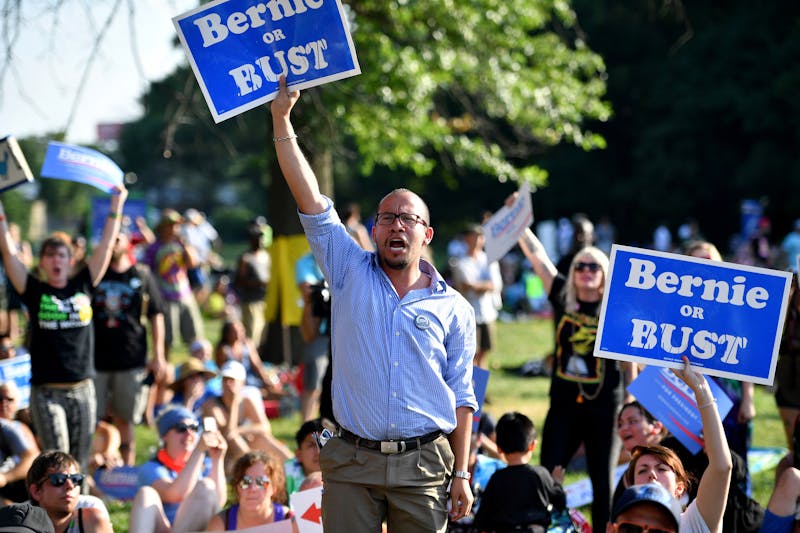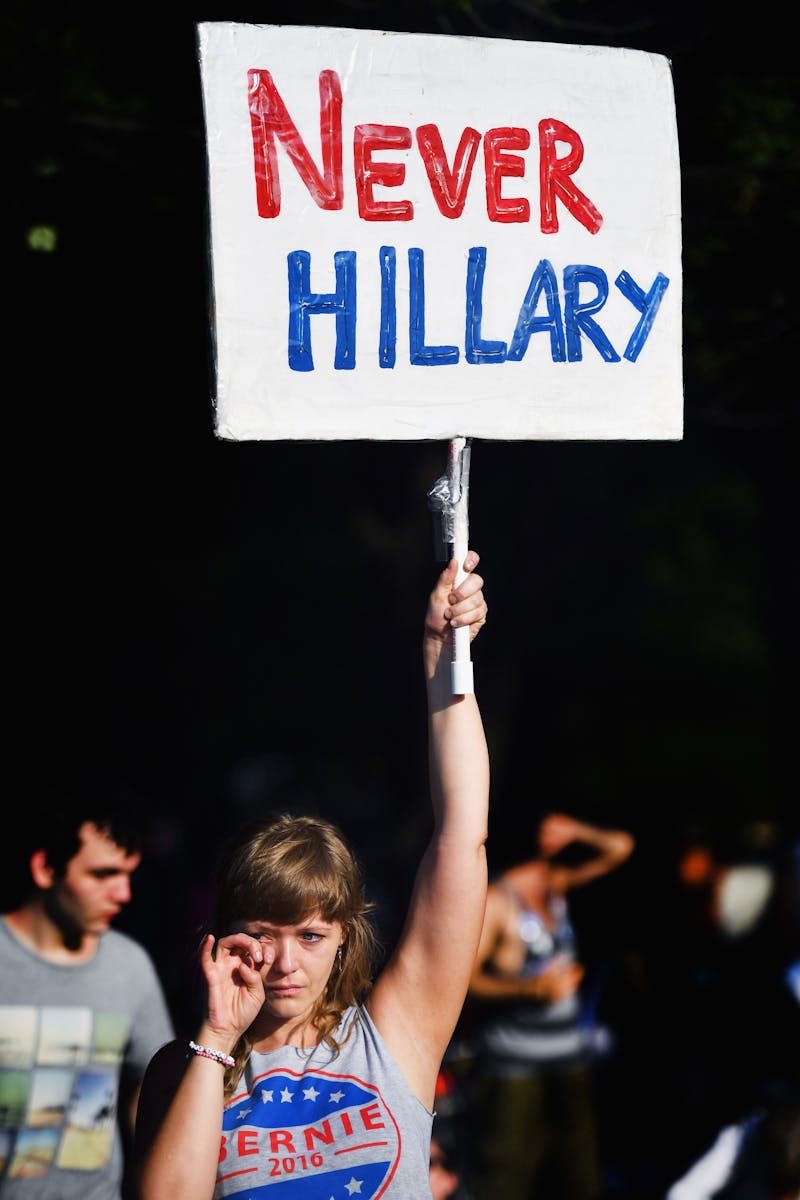Cecile Perez’s head was spinning. A 25-year-old Bernie Sanders delegate from Idaho, she had just walked out of the Democratic National Convention to join a protest on the streets of Philadelphia that had been going on in one form or another all week: the dissidents unwilling, for the moment, to accept their candidate’s defeat.
“I haven’t ever done something this outspoken before,” she says while riding the subway to a protest at City Hall. “We were on the floor and then we were leaving, and now, wow, we’re here, we’re on the subway, we’re going to join this protest.”
Perez described how her frustration had grown over the past 48 hours, how the “unity” theme was forced on her, how party officials lied to her about what signs they could bring, how controlling they were.
“It shocked me,” she said. “And I try to be gracious about everything. But there’s so much wrong, and it’s so unsavory, we just need to make ourselves heard saying so—that we don’t like it and we want to speak up about it.”
Stories like Perez’s have been the trend in Philadelphia, especially since Monday afternoon, when it became clear that not every Sanders delegate was prepared for a nationally televised show of unity. In the halls of the Wells Fargo Center, camera crews pin down Sanders delegates; the more outlandish, the better. On Tuesday, there were as many as three or four such interviews occurring at any given time: a man with a beard dyed blue, another in a Technicolor hat with Bernie Sanders name across the brim. The delegates were peppered with questions: “Have you accepted Bernie’s loss?” “Is the convention treating you fairly?” “Are you considering voting for Trump?” When one delegate stopped mid-interview to shout hello at passing friends, the cameraman waved them over, too.
“Bernie?” the cameraman asked.
“Bernie!” they yelled back.
“Great, we want as many of you as we can find.”
Political writers have joined the hunt as well. For the past few days they have been wandering onto the convention floor, or out to the protests beyond the gate to locate quotable Sanders fans. Once they find them, there’s the matter of choosing an angle. In some cases, the contempt is barely contained. “Pinning the Bernie Delegates Network down on even the loosest facts has been an exercise in high farce,” wrote Gideon Resnick of The Daily Beast. “In fact, it would appear that they are entirely disorganized, have no specific plans…” In others, like Julia Ioffe’s Politico Magazine profile of a revolt in the New Mexico delegation, the tone is closer to bemusement.
The reports are issued, and the commentators go to work, incredulously sharing the most outlandish passages, distilling the whole purported “Bernie or Bust” movement down to simple psychology: They’re “acting like children,” or they’re gender-privileged; they’re “the special-est of special snowflakes,” they’re ignorant of basic facts. They’re sad stuff, “literally crying” with “mildly witty signs.” Even the late-night hosts got in on it.
This is, in theory, undertaken with a serious purpose: Dissent like this might help Donald Trump become president. But it is clearly fun, too. It’s hot in Philadelphia, which the media has relentlessly complained about, and this convention—bereft of any real surprise or violent conflict—is long and dull, at least until primetime. What better distraction, and what better story copy, than to interview angry naïfs on the threatening revolt?
But speaking to delegates and protestors over the past few days, I’ve found ambivalence more common among the Sanders delegates, even those not ready for Hillary. Asked how they are feeling, they talk about frustration and uncertainty, a sadness that has not yet worn off. Some, like Illinois state Representative Will Guzzardi, have already committed to supporting Clinton, but nonetheless struggle to articulate their disappointment. Sitting on a bench outside the convention center, half an hour after Clinton’s nomination on Tuesday, the ordinarily articulate Guzzardi cut himself short several times before finding the right words. He eventually settled on “It sucks.”
“It sucks,” he said again, “and you get mad for a while, and eventually you move on, but it sucks.” Guzzardi, at least, has some experience with this. In 2012, he was defeated in his first race for the Illinois state House, losing by an extremely narrow margin to a well-connected incumbent. “There were people on my staff then who were furious,” he said. “People telling me they cheated, they stole it, but we got past it.” He was elected to the same seat two years later. “It’s obviously a way smaller scale,” he told me, “but we went through it. Most of the Sanders delegates and supporters here, they’ve never been to anything like this before. They’ve never been through it.”

Not everyone was so dispirited. Not the teenage delegate who told me to “fuck off, corporate media” as he walked from the convention center toward the chanting in the park. And not Cathy, a retired woman I met at a march on Broad Street, who was inspired by the Sanders campaign to become politically active only this past year; she had been arrested before, and intended to be arrested again. But even Cathy, and others like her, speak like agitated mourners, as if they are trying to make sense of what is going on in their own moral universe. It is not that they lack conviction—“I know what I believe and I believe Clinton would be a disaster for millions of people,” one protestor in a “Feel the Bern” T-shirt told me Tuesday night—but they are unsettled. They know that they are faced with a choice they find genuinely disconcerting, the possibility of feeling rotten either way, of being ridiculed by someone no matter what they choose.
They are acutely aware that they are under pressure to reach hasty conclusions.
“It’s tough, because the second I was right outside the Wells Fargo Center after the walk out, a reporter started asking, ‘Do you support Hillary now, do you support Hillary now?’” Perez told me. “And it’s like, ‘Hold on, hold on a second, I don’t know, I don’t know yet.’ But in a way it’s like, it feels someone saying, ‘Alright, move along, time to go,’ you know?”
She believes she will vote for Clinton in the end, because she does not want Trump to become president. But there is a difference between the recognition of some future probable state of mind, and the fact of being there already.
What we are seeing in Philadelphia is the ordinary course of emotional life, treated by the national press corps as alien phenomena. These people valued something, and lost it. They believed in something, and have seen it frustrated. They now believe, and perhaps rightly so, that this loss will bring more pain to themselves and others, will make the world worse than it might have been. That is: They were, in a way often reported but rarely taken seriously, genuinely committed to the importance of their politics. Like any human in the face of frustration and loss, they will cope differently. Some will become morose. Some will recover quickly. Some will refuse to concede it’s over, become angry, and keep fighting. Some will decide, ultimately, to compromise; others to abide by their principles. Many will change their minds more than once.

In the meantime, the press has become fascinated, at times scornful, of people who do not treat politics like the professionals, without too much investment or sentiment, without a pragmatist’s instinct for instantaneous rational decision-making. Thousands of people, many of whom did not think of politics as anything but the imposed whims of others came to believe, rightly or wrongly, that they might make a better society for themselves—then they lost, and reacted in a thousand different ways, are still reacting, are only in the first week of this fallout. For this, they have been told to consider the stakes rationally, to make the practical decision or at any rate the decision that others would prefer.
All of this is unexceptional. The only unusual element is the spotlight on them, the constant scrutiny of journalists and staffers all around them, all day, inside the fence around the convention center.
It is a certain type of hell for the press, too. What are you to make of thousands of people mourning? It resists analysis; resists efforts to predict where they might end up in a hundred days or what they might do tomorrow on the floor. It resists the way we are more and more inclined to consider politics: as data, and decision-making, and simple, weighed incentives.
The reporters also feel an obligation to their readers: Something is going on here that we’ve got to make sense of. But there’s little sense to be made by interviewing anybody you can find and extrapolating the psychology of thousands. They do not know the future of their own hearts, either.
Near the end of the night, on a train toward city center, a middle-aged woman carrying a blue Sanders sign is sitting alone. Another commuter, an older woman, asks her if she came from the convention.
“A protest,” she says.
“For what?”
“Bernie Sanders.”
“But didn’t he lose?”
Yes, the woman says, “Yeah. Probably. Clinton is the nominee, he endorsed her, yeah. I guess. Yeah.” Her voice is flat.
“Then what were you—?”
She’s been asked this question before. “To show him support, to say we don’t want Hillary, or Trump, or any of these other people.”
“So what are you going to do in the election?”
“I don’t know.”
